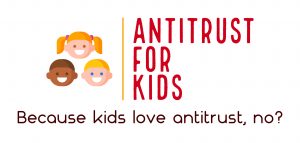Author: Molly Donovan
Nathan is nine. His grandmother makes excellent meatballs using an age-old family recipe. Together, Nathan and grandma decide to can the meatballs and sell them to their neighbors on the north side of town—just in time for the holidays as a turkey side dish.
Things went great until Nathan’s friend from school, Nicole, also started selling meatballs with help from her grandma. What are the chances? Fortunately, Nicole targeted sales on her side of town (the south side), so that the two meatball-preneurs didn’t directly butt heads.
Wanting to keep things that way, Nathan asked Nicole to make the arrangement official by forming a “strategic partnership”—the gist of it being that Nicole keep her meatballs out of the north side and Nathan keep his out of the south. Nathan even offered to compensate Nicole for any lost business she suffered from the arrangement, and to keep up appearances, Nathan would arrange a few sham transactions to make it look as though each meatball maker had a few sales in the other’s territory.
The glitch, unforeseeable to Nathan, was that Nicole’s dad works for the DOJ’s Antitrust Division. Well versed on the Division’s leniency program since birth, Nicole naturally reported the conduct to the government promptly—before agreeing to Nathan’s proposed deal.
And that was all it took. Although there was no meeting of the minds, so that Nathan couldn’t get nabbed for a Sherman Act Section 1 violation (criminal conspiracy), he did get tagged for a Section 2 violation—attempted monopolization. Poor Nathan was the youngest defendant ever to plead guilty to an antitrust felony. His sentence remains pending.
Moral of the Story: This is based on a true story! Nathan Zito, president of a paving and asphalt business pled guilty in October to attempted monopolization of the highway crack-sealing services in Montana and Wyoming based on his proposal to a competitor that they allocate markets by geography. Although the competitor was already cooperating with the DOJ, precluding a prosecution for Section 1, Nathan did plead guilty to attempted monopolization and will be subject to fines and imprisonment at his sentencing in February.
Nathan’s story bears out the DOJ’s recently-stated intention to prosecute Section 2 violations despite not having done so for the past 40 years. But whether Section 2 prosecutions will continue, and at what pace, is uncertain. (Listen to our podcast on this subject here).
We do note the somewhat unique circumstances of Nathan’s situation. A competitor outed him and cooperated with the DOJ’s investigation, presumably supplying the Division with the evidence necessary to prosecute—an unusual setting given that Section 2 conduct is typically unilateral (short of a failed attempt at joint conduct). Plus, Nathan’s conduct involved government procurement—an area under the Antitrust Division’s close watch, as we’ve seen in numerous prior occasions.
Still, businesses big and small should take this away: understand what conduct can get you into hot water and put systems in place to prevent even the appearance of impropriety. Antitrust compliance can save big in the end. In the meantime, enjoy your turkey-day meatballs.
 The Antitrust Attorney Blog
The Antitrust Attorney Blog



